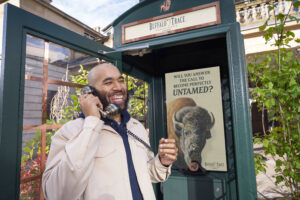Leaders Southampton issues advice to avoid rental scams

Following local reports of rental scams in the Southampton area, Leaders has issued the following advice to those looking to secure rental accommodation.
Allison Thompson, National Lettings Managing Director at Leaders Romans Group (LRG), said, “Something that you have to be mindful of if you’re looking to rent a property is rental scams. Unfortunately, these are fairly common, especially given how much is done online nowadays. According to the BBC Radio 4 show You and Yours, 4,800 rental scams were reported by the public in 2021, worth a total of £7 million. Thankfully, there are a number of signs that make many rental scams easy to spot and avoid.”
How to spot a rental scam
The listing is littered with errors
Before you start talking with someone about renting a property, you should inspect whether the property listing seems genuine. If it is littered with spelling mistakes or excessive use of punctuation or capital letters, there’s a high chance it could be a scam. The same goes if it is missing photos or key information or the same property is listed multiple times. Like the spam emails you’re probably already aware of avoiding, if it seems dodgy, be cautious.
The price seems too good to be true
Landlords and letting agencies are very clued up about how much properties can rent for. There is no reason why they would charge a lot less money to a tenant. After all, it provides an income to them, so it makes sense for them to charge a reasonable rent for that area. This is suspicious if a property is well below others listed in the same area. It is likely being used to get lots of people interested before asking for an up-front deposit for a property that isn’t a legitimate rental.
The property is listed on a free website
This one isn’t always as clear-cut as the others, as you can sometimes find legitimate properties on places like Gumtree and Facebook. However, sites like these, which are free to list on, are also a great target for scammers. Well-known portals like Rightmove and Zoopla, or legitimate lettings agent websites, are better places to find genuine rental listings.
Not being able to see the property in person
This is a massive red flag! If you’re being told you can’t see the property you’re interested in before you hand over money and sign contracts, it’s extremely likely to be a rental scam. Renting a property can be costly, and you have the right to see the place you live in and ensure it is suitable. There are no excuses as to why a viewing shouldn’t be available to you – if not in person, then a live virtual walkthrough should be offered as a minimum.
There’s no screening process for you as a tenant
Genuine landlords and professional lettings agents will have a tenant screening process in place. This is so they can check the tenants are who they claim to be, have the right to rent in the UK, and are going to be able to afford rent. This should be a warning sign if you’re not asked for a credit check or a rental application.
You’re being pressured to pay quickly
Scammers will often say they need a deposit quickly so you can “reserve” the place before someone else does. You should never pay until you have seen the property and have a legitimate contract in place. Do not transfer money if you ever feel uncomfortable or pressured to do so. Another red flag is being asked to wire money via a service like Western Union, which means it is being sent internationally. If a genuine landlord is based abroad, they would be using a letting agent to manage their properties and sort the finances.
Not getting to meet the landlord or letting agent in person
A genuine landlord or letting agent will also be happy to meet a prospective tenant as they want to ensure you’re legitimate, just like you want to with them. If they don’t wish to meet, you can presume they’re hiding Something.
There’s no lease agreement
Any verbal or verbal agreement over email without any contracts in place shouldn’t be trusted. Always insist on a lease, take your time to read through and understand it, and once signed, ensure that you also get a copy of it to keep on file.
The landlord can’t be found on any tenancy deposit scheme
All UK landlords must be part of a registered tenancy deposit scheme. One way to check a landlord is legitimate is to ask the details of which scheme they’re registered with and then check that they are, in fact registered with them. This can get tricky if someone is pretending to work for a letting agency that is registered with a scheme but they’re actually not a real member of staff. Several ways to verify who they are include directly contacting the agency, checking their website, or their LinkedIn employees.
What to do if you’ve been the victim of a rental scam
Call the police or report to Action Fraud
If you’ve had money stolen from you by a scammer, you should report this to the police. Try to give them as much information as possible, including any communication you have via email or any documentation you received. You can also report it on the Action Fraud website.
Inform the listing website
If you saw the property listing on a website, let the website know so someone can remove the listing and ban the lister.
Tell any lettings agency mentioned
Some scammers will use the name of a genuine lettings agency and pretend to be one of their staff. They will send documents with the agency’s name and even logo on to seem like they’re authentic. Ideally, if you had any doubts, you would speak to the agency before handing over any money to check if the person is really one of their staff. However, if you don’t realise until it’s too late, always get in touch with the agency to let them know you’ve been scammed by someone using their name so they can also report this to the police.
Avoiding rental scams
Unfortunately, once you’ve been scammed, despite reporting it, it can be extremely hard to get your money back. Any payments in cash, through wire transfer, or in cryptocurrency can be very hard to trace back to the scammer. As a reminder, these are the three key things you should ensure you do when looking for a rental property.
Inspect the rental listing
Make sure it looks legitimate; if it is filled with errors or looks like spam, ignore it. Trust portals and lettings agent websites more than free listing websites.
Meet the landlord or letting agent
You will want to know that the person you’re renting from is genuine, and likewise, they will want to know the same about you. If they say they can’t meet in person, then they should still be able to offer a virtual meeting.
See the property in person
Renting can be expensive, and you have every right to check the property you could be living in before you hand over any money. This helps you to see what condition it is in, check out the local area, and also meet someone in person to answer any questions. If excuses are made as to why you can’t view it, leave this behind and look for something else.




